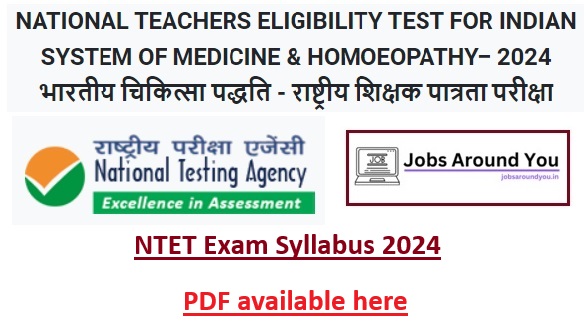NTET Syllabus 2024 & Exam Pattern:
National Testing Agency (NTA) has invited online application for National Teachers Entrance Test (NTET) 2024 for Post Graduates of Indian Systems Medicine and Homoeopathy who desire to take up teaching profession. Below is the schedule of Examination activities, Examination Pattern and NTET Syllabus:
| National Teachers Entrance Test – NTET Exam 2024 jobsaroundyou.in | |
| Online Registration Start Date | 24-Sep-2024 (Up to 11:50 P.M.) |
| Online Registration Closing Date | 22-Oct-2024 (Up to 11:50 P.M.) |
| Online Fee Submission Closing Date | 23-Oct-2024 (Up to 11:50 P.M.) |
| Correction of Particulars of Application Form | 24-Oct-2024 to 25-Oct-2024 (Up to 11:50 P.M.) |
| Language of Paper | English & Hindi |
| Link for Online Registration | Click Here |
| For more information | Information Bulletin PDF or Click Here |
NTET Scheme of Examination:
Below is the scheme and pattern of NTET Exam:
| Mode of Examination | Computer Based Test (CBT) |
| Duration | 120 minutes (02:00 Hours) |
| Type of Questions | Multiple Choice Questions with single correct response |
| No. of Questions | 100 |
| Maximum Marks | 100 |
| Scoring | 01 – For each correct response No Negative Marking 0 – For no response or not attempted questions. |
| Medium Of Paper | English/Hindi |
NTET Syllabus for AYUSH Teachers:
1. Teaching & Training:
- Teaching: Concept, Objectives, Levels of teaching (Memory, Understanding and Reflective), Characteristics, and basic requirements.
- Teaching methods, new methods of teaching (approach).
- Utilization of Basic teaching and basic skills of teaching.
- Understanding Learner’s characteristics: Characteristics of adolescent and adult learners (Academic, Social, Emotional and Cognitive), Individual differences.
- Factors affecting teaching related to: Teacher, Learner, Support material, Instructional facilities, Learning environment and Institution.
- Methods of clinical teaching/ bedside teaching
- Learning styles – VARK – Visual, Aural/Auditory, Reading/Writing & Kinesthetic
2. Communication:
- Communication: Meaning, types, characteristics and purpose of communication.
- Effective communication: Verbal and Non-verbal, Inter-Cultural and group Communications, Classroom communication
- Barriers to effective communication
- Mass-Media and Society
- Teacher-Learner communication
- Doctor-Patient communication
3. Classroom Management:
- Classroom Management
- Practical Classroom Management
- Psychology & Classroom Management
- Personal Approach to Classroom Management
- Ensuring Engagement & Motivation in the Classroom
- Routines & Technology in the Classroom
- Forming Positive Learning Environments
- Disciplinary Problems
- Management Strategies for Diverse Classrooms
- Managing classroom and other learning environments (clinical, OPD, Practical labs, skill labs, community outreach)
4. Assessment Methods:
- Concepts and principles of Learning assessment
- Evaluation in choice Based Credit System in Higher education
- Computer-based Testing
- Consideration of Innovations in evaluation systems
- Assessment of clinical competence
- Role of observation and feedback in assessment
- Structured oral exam, long case, short case and Objective Structured Clinical Exam (OSCE)
- Assessment Types: Formative and summative assessment; periodic assessment etc.
5. Educational Technologies:
- Advancement in educational technologies
- Information and Communication Technology (ICT): General abbreviations and terminology
- Usage of Internet, Intranet, E-mail, Audio and Video-conferencing
- ICT and Governance Methods of teaching in Institutions of higher learning: Teacher-centered vs. Learner-centered methods; Offline vs. Online methods (Swayam, Swayamprabha, MOOCs etc.).
- Teaching Support System: Traditional, Modern, and ICT based.
6. Educational Psychology:
- Educational psychology as a discipline
- Role of educational psychology – learning and teaching today
- Cognitive development: Brain and cognitive development,
- Guidelines to teaching: Piaget’s theory of cognitive development,
- Vygotsky’s Sociocultural perspective,
- Bronfenbrenner’s social context, Self and moral development
7. Andragogy in Education:
- Meaning of Andragogy
- Need and importance of Andragogy
- Principles of Andragogy
- Characteristics of Adult Learners
- Competencies of Self-Directed Learning
8. Learning and Pedagogy:
- Concepts of Pedagogy
- Meaning of Pedagogy
- Steps of Pedagogical Analysis
- Concepts of Critical Pedagogy
- Development of the concept of pedagogy
- Need and importance of Pedagogy
- Formulations of Learning Objectives, Teaching-Learning
Furthermore, you can download the PDF for NTET Syllabus from here: NTET Syllabus PDF.
Marking Scheme:
- Each question carries 01 (one) marks.
- For each correct response, candidate will get 01 (one) marks.
- There will be No Negative Marking.
- Un-answered/un-attempted will be given no marks.
- To answer a question, the candidate needs to choose one option as correct option.
- However, after the process of Challenges of the Answer Key, in case there are multiple correct options or change in key, only those candidates who have attempted it correctly as per the revised Answer key will be awarded marks.
- In case a Question is dropped due to some technical error, full marks shall be given to all the candidates irrespective of the fact who have attempted it or not.
Candidates are requested to visit the NTA Website from time to time for latest updates about exam schedule and any change in exam pattern/syllabus.

